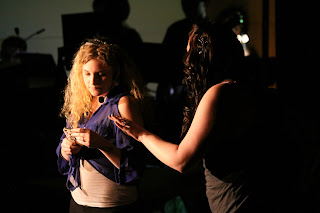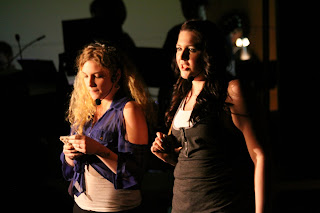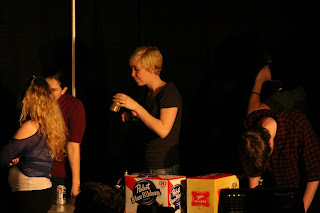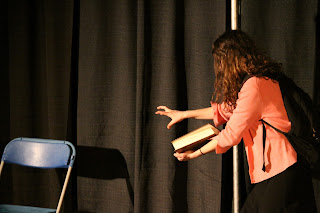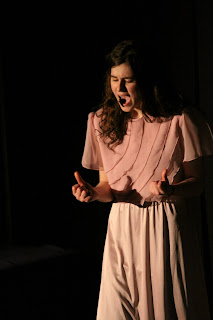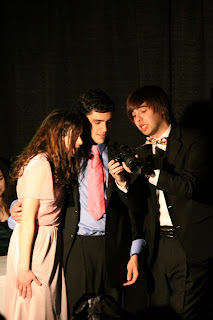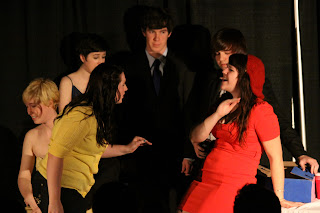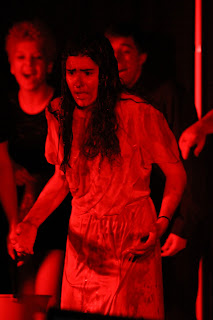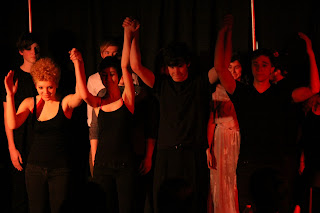Hey all-- Sean here. Can't believe that Carrie is over after working so incredibly hard on it. It was an incredible experience. Below is my director's note from the program:
"When did everybody decide I'm the one whose the flop/If I had a wish, God I wish they'd stop" was one of many original lyrics to the title song "Carrie". Although the lyrics were removed in this recent incarnation of the show for obvious reasons; it is strangely emblematic of the show's meaning and history. "Carrie: The Musical" has been known since 1988 to be Broadway's biggest financial flop, losing over $8 million upon its initial release. It was even the subject of a book by theatre critic Ken Maundelbaum: "Not Since Carrie: 40 Years of Broadway Flops". But if it flopped so hard, then how was has the show become such a cult phenomenon among theatre lovers?
Many people will tell you the reason is because it was a simply bizarre theatrical experience. There would be these beautiful dramatic sequences with Carrie and her mother, but the scenes with Carrie and her peers were often forgettable and misguided. Additionally, its initial try-out period was in London was nothing short of disastrous, as the writers were locked out of the process by the Terry Hands, the director and choreographer, Debbie Allen. Over time, they turned the show something no one was happy with. Even Barbara Cook, the original Margaret declined to transfer to Broadway with the show claiming, "I haven't been to Broadway in 20 years, I'm not coming back with this piece of shit."
While the original production was very obviously flawed, there were so many great moments in it, that I've learned to love and appreciate it. Now more than ever I've learned, sometimes we don't get things right the first time. This is my second time taking to Carrie to prom, as I like to think. I first directed a non-musical production of "Carrie" when I was sixteen which I adapted from the original 1974 Stephen King novel. It was an incredible experience to stage that story as my second show I ever directed and was a landmark moment for me as a director. It was during that production where even though there were many odds against my favor--my age and lack of experience, among other things--I knew that I had this passion to tell stories on stage and immerse myself in the art of directing. And importantly, I learned who Carrie was during that process and how the story resonated with me.
Carrie is the quintessential definition of awkward. She doesn't socialize well with others, is an only child and depending on the version, is extremely overweight and pudgy or conversely, very underweight and frail. She fucks up in gym class, and everyone is mercilessly taunted for her. Even though she's not mean to anyone, is kind of a weirdo and has this paranoid religious zealot mama--for some reason, she is always the first to be made fun of. Other people's enjoyment is always at her expenditure. She is always the last laugh. In an age where it seems as if shootings happen in schools and public places all across America, it is these to people I think "Carrie" is still relevant too, unfortunately. These people, after years of being shat on and ridiculed after being different suddenly snap after keeping their emotions bottled up for whatever reason, and these are the kids whose voices need to be heard and feelings understood. The people who lash out are everyday people that walk down school hallways and streets and are usually the last people we think about. The fact is, I have definitely considered myself as a victim of bullying growing up because of my ever-fluctuating weight and sometimes, sexual orientation (and to an extent, social awkwardness), my way of expressing myself is through creating art, not killing people. This story, if you will, is many ways an anthem to the misunderstood--and to ask the audience, "what does it cost to be kind?"
It is for this reason that I am thankful that Stafford Arima and the MCC for giving this piece a chance by revisiting the show last spring and improving upon it. The unintentional camp of the original was completely stripped away, and the story was re envisioned for a modern generation. It had a large emphasis on social outreach by organizing high school trips to see the performance and broadening their audience. When I saw Stafford Arima at intermission, I told him that I wanted to direct the first college production of this show to which he politely chuckled at, and a year later, here I am.
There are so many people who I would this production to whom it would not be possible. To my cast and crew of my 2008 non-musical production, thank you for everything you've taught me in telling this story in a theatrical way. To my Jake, Haley, Michael, the cast, crew and musicians-- this time around, thank you for allowing me to tell that story again, only this time through an awesome rock score.
Much love,
Sean
Macabre Theatre Ensemble at Ithaca College































